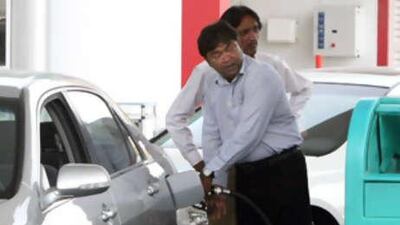Earlier this month, Emirates National Oil Company, better known as Enoc, embarked on a bold project: getting the drivers of Dubai and the northern emirates to leave the air-conditioned, window-tinted, leather-upholstered comfort of their cars to pump their own petrol. They weren't the first to try. Abu Dhabi National Oil Company, or Adnoc, launched a similar program in March. Both companies are primarily concerned with nudging customers toward making more purchases at their convenience stores. But the Enoc program was notable for its timing. The company waited until the hottest month of the year because it was the best way to test people's willingness to fill their own tanks.
In my five months in the country, I'd never seen anyone pump his own fuel, even when the weather was pleasant. I was curious as to how these companies planned to change people's deeply ingrained behaviour. So one recent morning, I struck out to catch one of the UAE's petroleum consumption pioneers in action. It wasn't easy. I had to go to several stations before finding one that offered the option, and when I finally pulled into the arc of cars queuing behind the "Self-Service" sign at the Adnoc station on Salam Street, I noticed that no one in front of me was leaving his car. Like the lines for full service, this one had two attendants in blue uniforms who looked every bit as busy as their colleagues. I asked one of them, a fresh-faced Indian youth named Ashraf Mayyala Ali, why he was filling up cars that had queued for self-service.
"Before, maybe two months back, the company decided that if the customer is requesting, we will fill," he said. "Otherwise, we will inform how to fill." On this busy morning, no one was requesting self-service. Car after car pulled up silently to the pump. The only question that was asked, so regularly that it became a kind of chant, was "cash or charge?" This was apparently the way the drivers wanted it. A Palestinian man in a crisply pressed button-down replied "no thank you" to the idea of ever pouring his own petrol; a labourer in an truck from the municipality just shook his head sheepishly at the idea. A rugged-looking Egyptian man in an equally rugged-looking pick-up truck thought the idea had merit, but he wasn't going to try it today. Many seemed surprised to discover that they were in the self-service line at all.
"People do not like to fill up self," Ali explained. "They need help." But it would likely be different if the self-service petrol were actually cheaper. The current system puts the savings from pumping one's own petrol on a card that customers can use at Adnoc Oasis stores or donate to charity. I went inside to see if anyone had redeemed their points, but couldn't get anywhere near the counter. A crush of 50 men, most dressed in traditional Pakistani garb, stood amid the aisles of chocolate and plush toys. Their impatience was fermenting into anger.
"It's been like that for the last 15 days," said Shane Nier, the shift manager of the Marybown restaurant at the back of the store. "It's because they have opened the new cards for the diesel, and it's much less expensive than in Dubai." Adnoc has been inundated by haulers as its diesel prices have held steady while those of its competitors, which rise with global markets, have more than doubled in the last six months. The company instituted a pre-paid card system to limit the crowds driving in from other emirates, but on this day there seemed to be only one person assigned to administer that system. The car park was a frenzy of deadlocked honking, and the lines stretched much of the way down the street.
"It's crazy," Nier said, shaking his head. "Everyone is angry." The scene was so chaotic that you could hardly blame the office-bound crowd for not wanting to get out of their cars. But the spectacle did answer my question, in a way. People will change their behaviour - in this case, by driving across hours of desert motorway - for the sake of cheaper fuel. They are just not likely to change for discount chocolate bars.
khagey@thenational.ae

